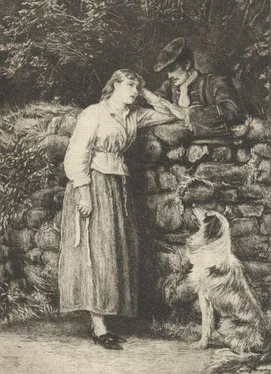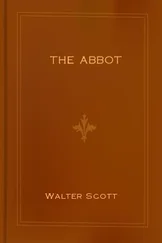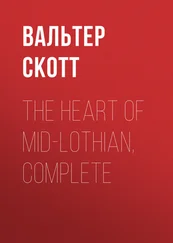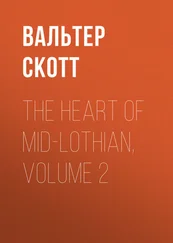Walter Scott - The Heart of Mid-Lothian
Здесь есть возможность читать онлайн «Walter Scott - The Heart of Mid-Lothian» весь текст электронной книги совершенно бесплатно (целиком полную версию без сокращений). В некоторых случаях можно слушать аудио, скачать через торрент в формате fb2 и присутствует краткое содержание. Год выпуска: 2004, Жанр: Исторические приключения, на английском языке. Описание произведения, (предисловие) а так же отзывы посетителей доступны на портале библиотеки ЛибКат.
- Название:The Heart of Mid-Lothian
- Автор:
- Жанр:
- Год:2004
- ISBN:нет данных
- Рейтинг книги:3 / 5. Голосов: 1
-
Избранное:Добавить в избранное
- Отзывы:
-
Ваша оценка:
- 60
- 1
- 2
- 3
- 4
- 5
The Heart of Mid-Lothian: краткое содержание, описание и аннотация
Предлагаем к чтению аннотацию, описание, краткое содержание или предисловие (зависит от того, что написал сам автор книги «The Heart of Mid-Lothian»). Если вы не нашли необходимую информацию о книге — напишите в комментариях, мы постараемся отыскать её.
The Heart of Mid-Lothian — читать онлайн бесплатно полную книгу (весь текст) целиком
Ниже представлен текст книги, разбитый по страницам. Система сохранения места последней прочитанной страницы, позволяет с удобством читать онлайн бесплатно книгу «The Heart of Mid-Lothian», без необходимости каждый раз заново искать на чём Вы остановились. Поставьте закладку, и сможете в любой момент перейти на страницу, на которой закончили чтение.
Интервал:
Закладка:
"Answer me but one," said Butler. "Is it all freely and indisputably your own property, to dispose of it as you think fit?—Is it possible no one has a claim in so large a sum except you?"
"It was mine, free to dispose of it as I like," answered Jeanie; "and I have disposed of it already, for now it is yours, Reuben—You are Bible Butler now, as well as your forbear, that my puir father had sic an ill will at. Only, if ye like, I wad wish Femie to get a gude share o't when we are gane."
"Certainly, it shall be as you choose—But who on earth ever pitched on such a hiding-place for temporal treasures?"
"That is just ane o' my auld-fashioned gates, as you ca' them, Reuben. I thought if Donacha Dhu was to make an outbreak upon us, the Bible was the last thing in the house he wad meddle wi'—but an ony mair siller should drap in, as it is not unlikely, I shall e'en pay it ower to you, and ye may lay it out your ain way."
"And I positively must not ask you how you have come by all this money?" said the clergyman.
"Indeed, Reuben, you must not; for if you were asking me very sair I wad maybe tell you, and then I am sure I would do wrong."
"But tell me," said Butler, "is it anything that distresses your own mind?"
"There is baith weal and woe come aye wi' world's gear, Reuben; but ye maun ask me naething mair—This siller binds me to naething, and can never be speered back again."
"Surely," said Mr. Butler, when he had again counted over the money, as if to assure himself that the notes were real, "there was never man in the world had a wife like mine—a blessing seems to follow her."
"Never," said Jeanie, "since the enchanted princess in the bairn's fairy tale, that kamed gold nobles out o' the tae side of her haffit locks, and Dutch dollars out o' the tother. But gang away now, minister, and put by the siller, and dinna keep the notes wampishing in your hand that gate, or I shall wish them in the brown pigg again, for fear we get a black cast about them—we're ower near the hills in these times to be thought to hae siller in the house. And, besides, ye maun gree wi' Knockdunder, that has the selling o' the lands; and dinna you be simple and let him ken o' this windfa', but keep him to the very lowest penny, as if ye had to borrow siller to make the price up."
In the last admonition, Jeanie showed distinctly, that, although she did not understand how to secure the money which came into her hands otherwise than by saving and hoarding it, yet she had some part of her father David's shrewdness, even upon worldly subjects. And Reuben Butler was a prudent man, and went and did even as his wife had advised him. The news quickly went abroad into the parish that the minister had bought Craigsture; and some wished him joy, and some "were sorry it had gane out of the auld name." However, his clerical brethren, understanding that he was under the necessity of going to Edinburgh about the ensuing Whitsunday, to get together David Deans's cash to make up the purchase-money of his new acquisition, took the opportunity to name him their delegate to the General Assembly, or Convocation of the Scottish Church, which takes place usually in the latter end of the month of May.
CHAPTER TWENTY-SIXTH.
But who is this? what thing of sea or land—
Female of sex it seems—
That so bedeck'd, ornate, and gay,
Comes this way sailing?
Not long after the incident of the Bible and the bank-notes, Fortune showed that she could surprise Mrs Butler as well as her husband. The Minister, in order to accomplish the various pieces of business which his unwonted visit to Edinburgh rendered necessary, had been under the necessity of setting out from home in the latter end of the month of February, concluding justly that he would find the space betwixt his departure and the term of Whitsunday (24th May) short enough for the purpose of bringing forward those various debtors of old David Deans, out of whose purses a considerable part of the price of his new purchase was to be made good.
Jeanie was thus in the unwonted situation of inhabiting a lonely house, and she felt yet more solitary from the death of the good old man who used to divide her cares with her husband. Her children were her principal resource, and to them she paid constant attention.
It happened a day or two after Butler's departure that, while she was engaged in some domestic duties, she heard a dispute among the young folk, which, being maintained with obstinacy, appeared to call for her interference. All came to their natural umpire with their complaints. Femie, not yet ten years old, charged Davie and Reubie with an attempt to take away her book by force; and David and Reuben replied, the elder, "That it was not a book for Femie to read," and Reuben, "That it was about a bad woman."
"Where did you get the book, ye little hempie?" said Mrs. Butler. "How dare ye touch papa's books when he is away?" But the little lady, holding fast a sheet of crumpled paper, declared "It was nane o' papa's books, and May Hettly had taken it off the muckle cheese which came from Inverara;" for, as was very natural to suppose, a friendly intercourse, with interchange of mutual civilities, was kept up from time to time between Mrs. Dolly Dutton, now Mrs. MacCorkindale, and her former friends.
Jeanie took the subject of contention out of the child's hand, to satisfy herself of the propriety of her studies; but how much was she struck when she read upon the title of the broadside-sheet, "The Last Speech, Confession, and Dying Words of Margaret MacCraw, or Murdockson, executed on Harabee Hill, near Carlisle, the day of 1737." It was, indeed, one of those papers which Archibald had bought at Longtown, when he monopolised the pedlar's stock, which Dolly had thrust into her trunk out of sheer economy. One or two copies, it seems, had remained in her repositories at Inverary, till she chanced to need them in packing a cheese, which, as a very superior production, was sent, in the way of civil challenge, to the dairy at Knocktarlitie.
The title of this paper, so strangely fallen into the very hands from which, in well-meant respect to her feelings, it had been so long detained, was of itself sufficiently startling; but the narrative itself was so interesting, that Jeanie, shaking herself loose from the children, ran upstairs to her own apartment, and bolted the door, to peruse it without interruption.
The narrative, which appeared to have been drawn up, or at least corrected, by the clergyman who attended this unhappy woman, stated the crime for which she suffered to have been "her active part in that atrocious robbery and murder, committed near two years since near Haltwhistle, for which the notorious Frank Levitt was committed for trial at Lancaster assizes. It was supposed the evidence of the accomplice Thomas Tuck, commonly called Tyburn Tom, upon which the woman had been convicted, would weigh equally heavy against him; although many were inclined to think it was Tuck himself who had struck the fatal blow, according to the dying statement of Meg Murdockson."
After a circumstantial account of the crime for which she suffered, there was a brief sketch of Margaret's life. It was stated that she was a Scotchwoman by birth, and married a soldier in the Cameronian regiment—that she long followed the camp, and had doubtless acquired in fields of battle, and similar scenes, that ferocity and love of plunder for which she had been afterwards distinguished—that her husband, having obtained his discharge, became servant to a beneficed clergyman of high situation and character in Lincolnshire, and that she acquired the confidence and esteem of that honourable family. She had lost this many years after her husband's death, it was stated, in consequence of conniving at the irregularities of her daughter with the heir of the family, added to the suspicious circumstances attending the birth of a child, which was strongly suspected to have met with foul play, in order to preserve, if possible, the girl's reputation. After this she had led a wandering life both in England and Scotland, under colour sometimes of telling fortunes, sometimes of driving a trade in smuggled wares, but, in fact, receiving stolen goods, and occasionally actively joining in the exploits by which they were obtained. Many of her crimes she had boasted of after conviction, and there was one circumstance for which she seemed to feel a mixture of joy and occasional compunction. When she was residing in the suburbs of Edinburgh during the preceding summer, a girl, who had been seduced by one of her confederates, was intrusted to her charge, and in her house delivered of a male infant. Her daughter, whose mind was in a state of derangement ever since she had lost her own child, according to the criminal's account, carried off the poor girl's infant, taking it for her own, of the reality of whose death she at times could not be persuaded.
Читать дальшеИнтервал:
Закладка:
Похожие книги на «The Heart of Mid-Lothian»
Представляем Вашему вниманию похожие книги на «The Heart of Mid-Lothian» списком для выбора. Мы отобрали схожую по названию и смыслу литературу в надежде предоставить читателям больше вариантов отыскать новые, интересные, ещё непрочитанные произведения.
Обсуждение, отзывы о книге «The Heart of Mid-Lothian» и просто собственные мнения читателей. Оставьте ваши комментарии, напишите, что Вы думаете о произведении, его смысле или главных героях. Укажите что конкретно понравилось, а что нет, и почему Вы так считаете.








